Editor of Ben Ish Chai's Writings: "We Found His Books in Saddam Hussein's Bombed Bunker"
Rabbi Yosef Chaim Mizrahi shares insights into the unique personality of the Ben Ish Chai and over 50 of his published works. Also: how one of his stolen books was recovered with the advice of the Baba Sali, and how 10,000 people managed to hear his voice.
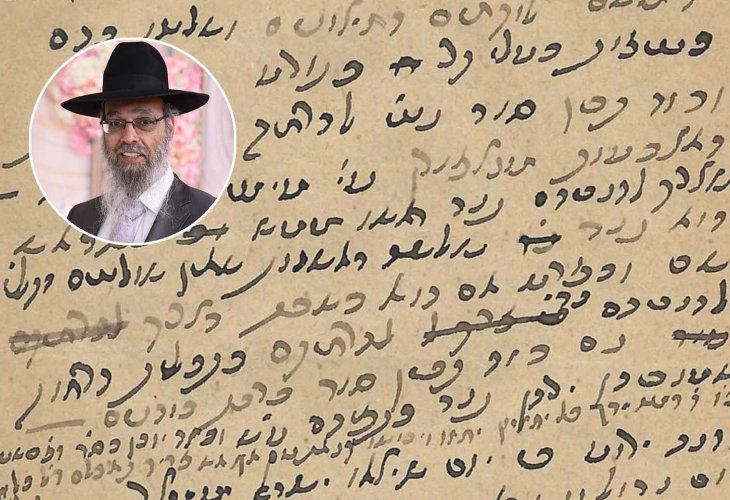 (Inset: Rabbi Yosef Chaim Mizrahi)
(Inset: Rabbi Yosef Chaim Mizrahi)He never held an official position, yet he was the rabbi of all the Jews of Babylon. The entire community accepted him as their spiritual leader, and his fame spread not only in Iraq but also in Kurdistan, Aleppo, Persia, Constantinople, and even Poland. Rabbi Yosef Chaim, known as "Ben Ish Chai" after his famous book, was a great sage of Israel who lived in Baghdad around 150 years ago. "He wrote more than 60 books covering various fields – halacha, Torah sermons, prayers, Kabbalah, and more," says Rabbi Yosef Chaim Mizrahi, editor of his writings. "After his passing, some of them were brought to Israel by his grandson, others remained in synagogues in Baghdad, and some were looted. Even Saddam Hussein, the cruel ruler of Iraq, took some of them into his basements. Additional writings were found after Baba Sali, with his special insight, pointed out that they were hidden in a certain person's house." Since then, Rabbi Mizrahi has continued the slow process of reconstructing the books and shares some of the miracles he has witnessed on the way to discovering and publishing them.
Books from the Battlefield
From a young age, Rabbi Mizrahi felt a special connection to the figure of the Ben Ish Chai. "I saw his picture, and something in it touched me deep in my heart. I felt that I had to know who this wise man was," he recalls. "Over the years, I had the privilege of learning from his books and became acquainted with his manuscripts, which were in the hands of Rabbi Yeshua Salem and Rabbi David Yehudayoff, the son-in-law of Baba Sali. After Rabbi Yehudayoff's passing, I was asked to take his place in publishing the writings. Since then, I've been fortunate to go through dozens of manuscripts that came to us in various ways, and now there are already over 50 books by Ben Ish Chai published."
Every manuscript found contains many transformations. "Some of the writings were brought from Baghdad by the grandson of the Ben Ish Chai in the 1950s, but many remained there due to the prohibition of taking them out of the country," explains the rabbi. "Some were stolen over time or brought to Israel by different people, and some stayed at the 'Meir Tweg' synagogue in Baghdad. Saddam Hussein, in his time, understood their great value and therefore took the remaining writings from the synagogues and stored them in his basements. During the Gulf War, the basements were bombed and flooded with water. A Jewish American soldier on site saw the scattered writings and started collecting them with his comrades. They dried them in the sun, causing the ink to fade from the pages. That soldier sought the help of Jewish and American organizations, and so the writings reached Washington. They were mistakenly uploaded to Arabic archive sites, due to the script appearing Arabic, and that’s where we found them. We began a thorough and slow process of organizing the pages and reconstructing the faded letters until finally we managed to publish them. Most of them were added to the book 'Rav Pealim,' and the rest to 'Derashot for Shabbat Shuva,' 'Commentaries on Pirkei Avot,' and 'Birkat Chaim' on the haftarot."
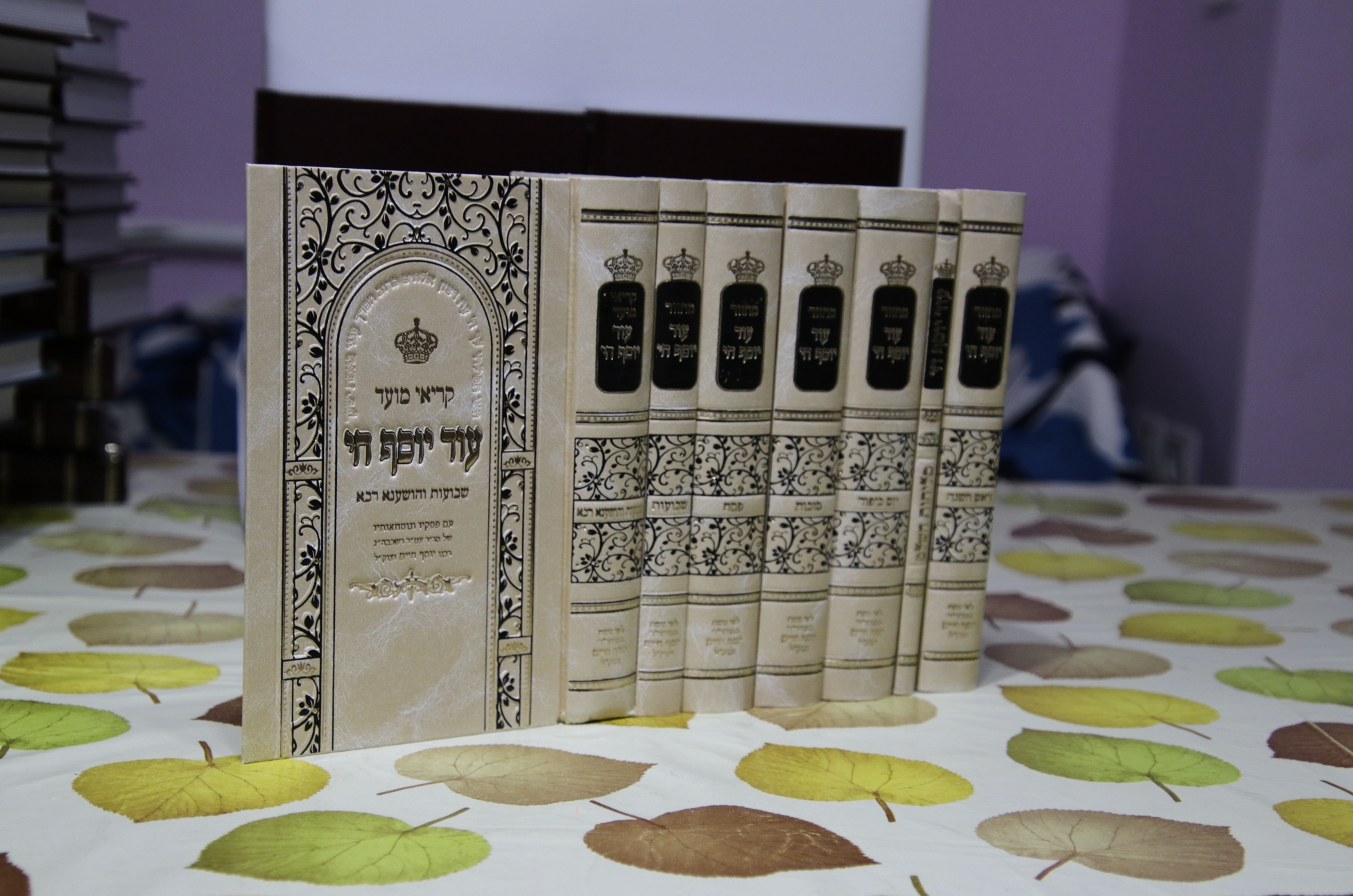
Discoveries of additional books happened over time. "In 2013, I went to pray at the Ben Ish Chai's site on the Mount of Olives and asked him for the merit to discover more writings," describes the rabbi. "I saw how in many places in his compositions he mentions a book called 'Makbatziel,' and I very much wanted to find this book. Some time later, a Jew came to me, claiming he had original writings by the Ben Ish Chai. When I got to him, I discovered a treasure of about 400 pages. I sat down to sift through them and saw that much of what was written there didn’t appear in the Ben Ish Chai book. After extensive research, I discovered that all the references of the rabbi to the book 'Makbatziel' corresponded with this book. I consulted with rabbis, some agreed it was the lost book and some did not. The late Maran Rabbi Ovadiah Yosef was very interested, asked to see the manuscript, and wrote us a recommendation in order to purchase it, explaining it was a redemption of captives. We managed to buy a copy and thus brought the book to print."
What does it take to publish the manuscript?
"The writings do not come to us organized but as a pile of paper scraps, sometimes even half-torn pages. We try to connect page to page, a real tedious task. It takes time to figure out what each page belongs to, and some still remain uncertain. As for the originality of the writings, the Ben Ish Chai has a unique handwriting style, known as 'Half-Kolmus script.' The pages the rabbi used to write on are also of a particular kind, so we can know they are attributed to him."
During the work of collecting the writings, there are also surprises. "We had a question asked by Rabbi Yaakov Chaim Sofer, author of 'Kaf Ha'Chaim,' to the Ben Ish Chai, without an answer," recalls the rabbi. "One day, I was at the writing institute sorting books. During the work, I found a photo of a Ben Ish Chai manuscript. After prolonged reading, I realized that the answer to Rabbi Sofer's question was in that manuscript, and we connected the two."
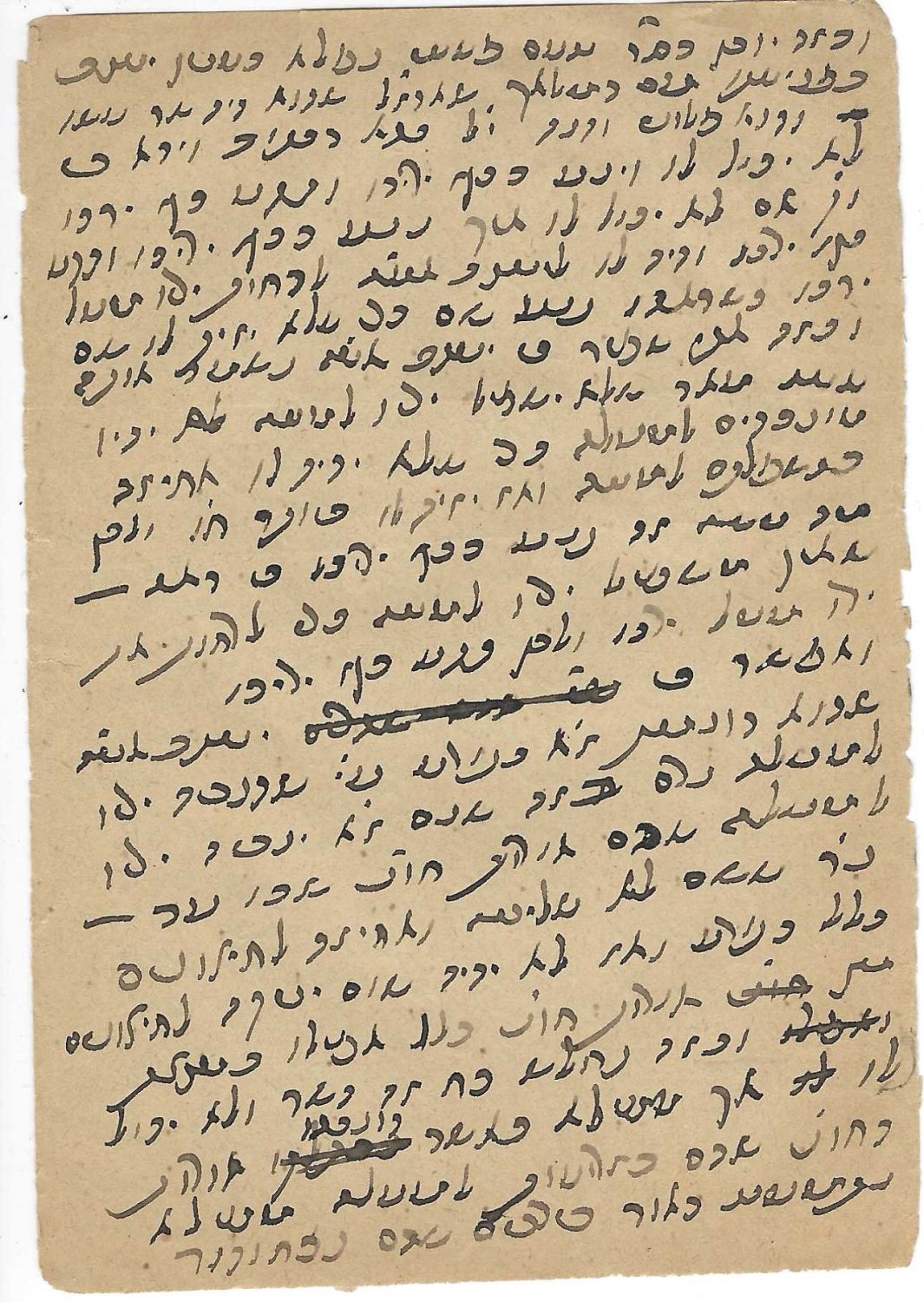
How can it be explained that the work of collecting the writings continues to this day?
"Unfortunately, people familiar with Rabbi David Chaim, the grandson of the Ben Ish Chai, took some writings from him and never returned them. Rabbi David Yehudayoff, who worked on this issue, asked for a blessing from his father-in-law – Baba Sali, to have the merit to locate them. At that time, they knew of a person who had taken books and claimed they were no longer with him. Baba Sali blessed his son-in-law and instructed him and Rabbi Yeshua Salem to enter the house of that person to find what had been stolen there. When they arrived, that person refused to open the door. Therefore, a few days later, they came disguised, and when he opened, they left him no choice but to let them in to search. They found piles of papers in his bedroom, which later printed the book 'Benayahu' on the Talmud. When they came to inform Baba Sali, he said, 'You haven’t taken everything yet.' The two re-entered the house, but found nothing. Just before giving up, Rabbi Yeshua saw an old sewing machine. In those times, when the machine was closed, its pedal was on it. Rabbi Yeshua moved the pedal, and more manuscripts fell out of it. Over time, the book 'Ben Ish Chail' on the Ben Ish Chai's sermons for Shabbat was published from them. When the two returned for the third time to Baba Sali, he said, 'There are more writings elsewhere, but I have done my part, from now on Rabbi Yosef Chaim will work for them.'"
What have you discovered since?
"We are constantly discovering new writings, just last month we found five more. To date, we have reached about 64 books: sermons on the Torah and haftarot, 'Chukei Ha'Nashim,' 'Mayim Chaim,' 'Ben Ish Chai,' 'Od Yosef Chai,' 'Makbatziel,' 'Sheva B'Adar,' commentaries on the Megillahs, on Psalms and the Passover Haggadah, a book of prayers, and studies on Rabbi Shimon bar Yochai, among others. Rabbi Yosef Chaim even wrote a book of riddles – for children, adults, women, Torah scholars, and Kabbalists, called 'Imrei Bina.' At the time, Rabbi Yaakov Kazin and Rabbi Avraham Harari Raful solved some of the riddles, and we worked on solving the rest with divine help."
Divine Presence Spoke from His Mouth
The famous sermons of the Ben Ish Chai were also printed. "Four times a year, he would preach in the great synagogue of Baghdad – on Shabbat Teshuva, Shabbat Zachor, Shabbat HaGadol, and Shabbat Kalla – before Shavuot," says the rabbi. "On those Shabbats, he was the only preacher in the city, and about 10,000 people would flock to the synagogue and sit to listen to him. The rabbi would spice up his words with parables and stories, which captivated the listeners' hearts. There were no air conditioners then, the heat was intense, yet people would drink up his words with thirst for about 4 hours. These sermons were written in his own handwriting, sometimes copied by him or his son several more times. The Ben Ish Chai had immense patience to write again and again, and we found sermons copied 4 times. We've managed to publish nine books from those sermons, each with about 500 pages."
The fact that such a large number of people managed to hear the rabbi attests to the divine assistance he received. "After his passing, when his son rose to preach for the first time on Shabbat Teshuva, people around shouted that they couldn't hear him. The son raised his voice and again the crowd said they couldn't hear. After another attempt, he descended from the podium and said, 'My father – the Divine Presence spoke from his mouth, only that way could so many people hear him, but I wasn't granted that, I can't do this.' It's possible to see here both the praise for the Ben Ish Chai, who was blessed with such a strong voice, and also the praise for the audience – who listened to him for several hours in the great heat. Just to understand how hot it was there, one of the sermons was dedicated for the elevation of the soul of Farha Sasson's father. The Ben Ish Chai told her that he wanted to send her the written words of the sermon, but couldn't copy them because all the pages stuck to him from the heat."
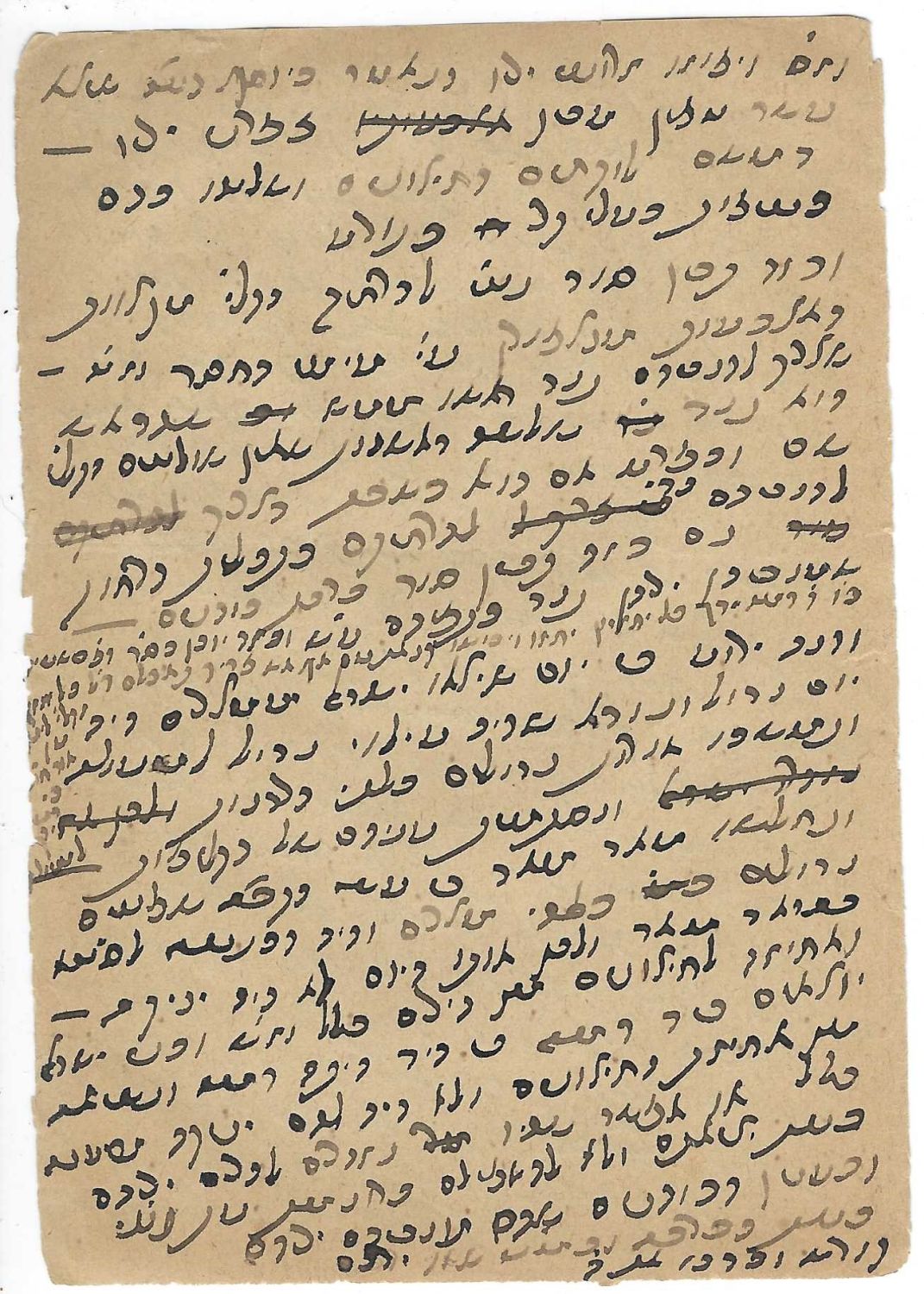
The figure of the Ben Ish Chai was beloved and admired by all around him. "At the Jewish court of Baghdad, they would consult with him on particularly complicated cases, and Rabbi Yechezkel Ezra HaLevi said about him that if they listened to the prophets the way they listened to him, Mashiach would have come," says the rabbi. "When the Ben Ish Chai rose to preach, he would take off his shoes and place them aside. Once, Rabbi Ephraim Zilka Cohen, the father of the late Chacham Shalom Cohen, came and kissed the shoes. The Ben Ish Chai asked him what he was doing, and he replied, 'I’m kissing Torah scroll skins.' His words were accepted by his listeners due to the humility he showed to each person. In one of his sermons, the Ben Ish Chai explains that there are people who feel that the sage is speaking only to the righteous and great of the world, and therefore can’t listen to him, 'but I, your humble servant,' he adds, 'am a simple person like you, and therefore surely my words are suitable for everyone.' Such was his humility."
Several people testified about Elijah's revelations to the Ben Ish Chai. "Rabbi Yehoshua Sherabani, his student, decided to find out who was the mysterious figure his teacher learned with on Saturday nights, and therefore came at that time to his house with a question in mind, entering without permission like a devoted student. The Ben Ish Chai came down to meet him from the attic where he was studying and answered his question even before hearing what it was, but asked him not to come uninvited next time. The rabbi's maid also saw another person in his room, so she went to bring another glass of water for him, but when she reached the room, she saw that the guest had disappeared, even though no one had opened the house door."
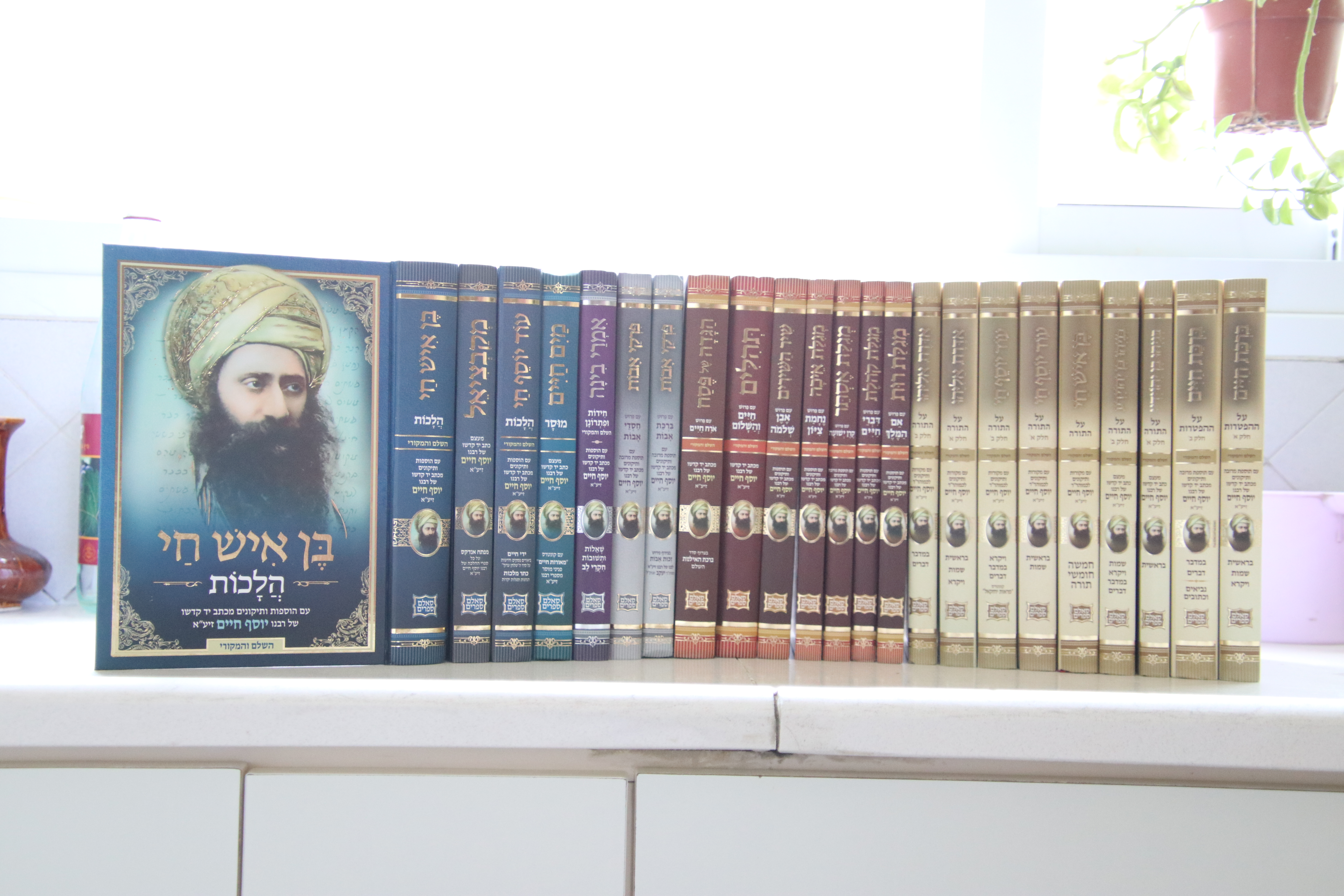
Rabbi Mizrahi witnesses admiration for the Ben Ish Chai's figure to this day. "I happened to meet a great professor of Baghdad origin, a man who does not wear a kippah," he describes. "When I asked him if he knew about the Ben Ish Chai, the professor took out his identity card from his pocket and showed me that inside was a picture of the rabbi. He not only knew about the Ben Ish Chai but greatly admired him, saying, 'He is our rabbi.'"
Returning to the books, "Some were brought to print only in recent years, and some have gone out of stock and are now being reissued in a new edition," says Rabbi Mizrahi. "Recently we released the 'Od Yosef Chai' series, which includes siddurs and also holiday machzorim, featuring the laws and customs related to prayers. In addition, we edited a special study book for Shabbat and holiday meals based on Ben Ish Chai's books, as well as a Tehillim book with his merits and prayers. People from across the country and around the world, from all backgrounds, constantly reach out to us wanting to purchase his books. It has been 113 years since the Ben Ish Chai’s passing, and his words continue to bring life to the world."
To purchase the Ben Ish Chai books, visit Hidabroot Shops, click here.

